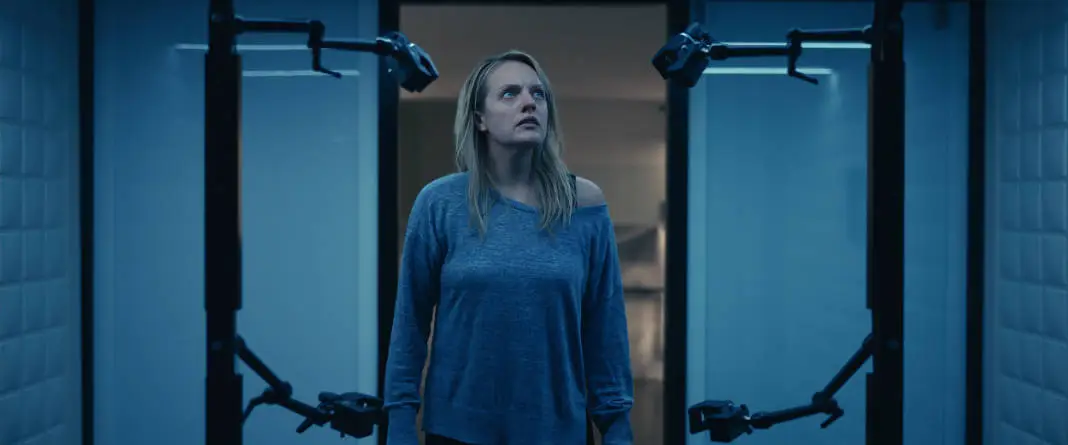Horror, more than any other genre, it seems, has its hand directly on the pulse of the here and now. It has to be – our fears are changing and evolving, even while those base instincts remain the same.
Our monsters may come with different, more modern costumes, but they are still monsters.

The Invisible Man, like many other Blumhouse horror films in recent years, knows what’s up – that the best horror films frighten us specifically because they are also commenting on the times that while we can jump and scream and have fun, the real horrors, the ones that do not go away when the lights come up, are just outside the theater doors. Waiting.
These monsters are exploiting a systemic societal norm that allows the monster to be a monster and not something that can easily be dismissed.

That’s why films like Get Out and The Invisible Man are so effective. Writer/director Leigh Whannell manages to take a more-than-a-century-old H.G. Wells novel and injects it with urgency and verisimilitude.
And boy, how The Invisible Man is effective. It feels reductive to say that The Invisible Man is a cinematic response to the Me Too movement, but let’s face it: the movie’s impact is made that much stronger because of current events. Harvey Weinstein was just found guilty of rape and sexual assault this week, so this is a constantly-evolving, important issue, and to set a movie like this right in the middle of all that gives The Invisible Man serious thematic weight.

As a critic, I take all of this into account when assessing a film like this, and thematically, The Invisible Man couldn’t be more relevant. Is it exploitative of the issues? That depends on your point of view, but director Leigh Whannell, or the movie, never wavers from its focus.
Cecilia (Elizabeth Moss) is being tormented by an unseen attacker, and this is never in doubt, even when the people around Cecilia doubt her. She has recently escaped her boyfriend, optics scientist Adrian Griffin (Oliver Jackson-Cohen), and is now staying at the house of her friend James (Aldis Hodge) and his daughter Sydney (Storm Reid).

When Cecilia learns from Adrian’s brother Tom (Michael Dorman) that Adrian committed suicide and left Cecilia several million dollars, it seems that, at first, she is safe. But Cecilia feels uneasy. There seem to be things out of place, a sense that someone is with her in the room even when there isn’t anyone there. Soon, Cecilia is convinced that Adrian is somehow still with her, but no one believes Cecilia, including her friends and her sister Alice (Harriet Dyer). Is Adrian haunting her from beyond, or something more sinister?
It may be early in the year yet, but if The Invisible Man doesn’t get some kind of awards recognition for its cinematography, someone isn’t paying attention. The camera floats from scene to scene, giving the audience a sense of dread and foreboding in even the most ordinary settings. Stefan Duscio’s work here is exquisite. Duscio, who previously worked with Whannell on his previous feature, Upgrade, brings that sense of playfulness here, making the audience almost complicit with the goings-on. We never know where the next attack is coming from, even when we are looking right at it.

A film like The Invisible Man probably wouldn’t be nearly as effective or fun without that horror staple, the jump-scare, but when I say those scares got me at least four times, maybe more, during the film’s run-time, believe it. The scares are legitimate, not a misdirection, and Whannell milks every last drop of tension out of every possible moment.
Not to sound too hyperbolic, but often, The Invisible Man reminded me of Jaws, how Steven Spielberg, with a few notes of music and a few edits, could evoke real tension and fear. Leigh Whannell does the same, with familiar settings — a kitchen, a bedroom, an attic — and a fantastic score by Benjamin Wallfisch. The Invisible Man is genuinely scary.

None of this would work without Elizabeth Moss as our surrogate, and she is completely up to the task. This is one of her best roles yet, and while casting Moss may be a bit shorthand these days for the kind of tortured character Cecilia is, Moss often surprises us and evokes real emotion that the audience responds to immediately.
We care for Cecilia and her struggles, and while a lesser director would overplay their hand, Whannell wisely practices restraint, and the result never feels exploitative.
Still, those who have experienced this kind of trauma should be aware that The Invisible Man may bring those feelings to the forefront. The film gets a lot of power from those scenes, and while this is a movie to scream and stomp your feet at, those scenes may be uncomfortable for some audience members.

The Invisible Man‘s first half is superior to the second half — when the film reveals what is happening, some of those plot points don’t quite stick as well as Leigh Whannell would like — but there are still plenty of thrills throughout that those erratic plot points are just a nitpick. Whannell, Stefan Duscio, Benjamin Wallfisch, and Elizabeth Moss give us such a mood and an atmosphere that it drowns out almost all complaints.
Even as timely as The Invisible Man is, if Whannell didn’t back that up with such a well-crafted film, the point would be lost. The fears of The Invisible Man are real and fears that women have every day. While The Invisible Man uses those fears as fuel for its effectiveness, it never mocks them and always takes them seriously.
The Invisible Man is as thoughtful as it is entertaining, as disturbing as it is frightening, and stays with you after you leave the theater. This is a great film.
The Invisible Man Review Score: 9/10
The Invisible Man opens in theaters on Friday, February 28th. You can view all our coverage of the movie by clicking here, and you can buy tickets at Fandango.

Alan Cerny has been writing about film for more than 20 years for such sites as Ain’t It Cool News, CHUD, Birth Movies Death, and ComingSoon. He has been a member of the Houston Film Critics Society since 2011. STAR WARS biased. Steven Spielberg once called Alan a “very good writer,” and Alan has the signed letter to prove it, so it must be true.